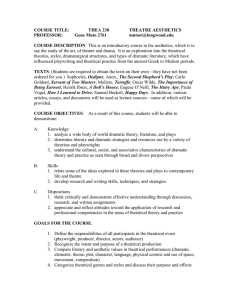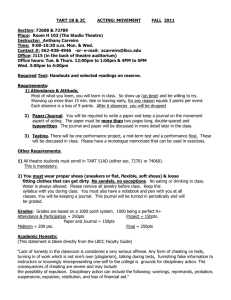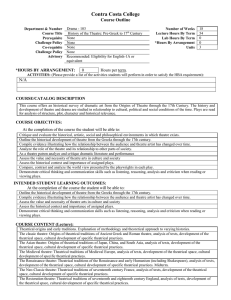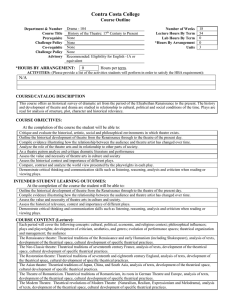Marquette University Learning Assessment Plan Performing Arts
advertisement
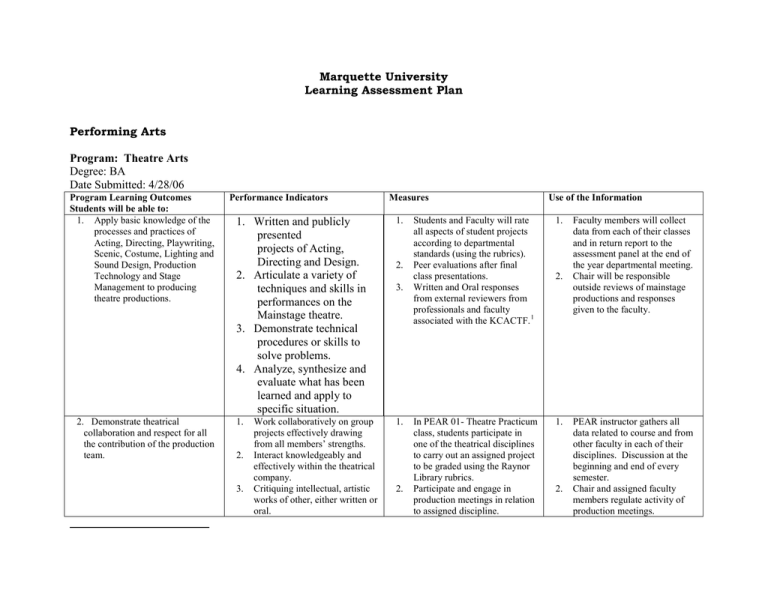
Marquette University Learning Assessment Plan Performing Arts Program: Theatre Arts Degree: BA Date Submitted: 4/28/06 Program Learning Outcomes Students will be able to: 1. Apply basic knowledge of the processes and practices of Acting, Directing, Playwriting, Scenic, Costume, Lighting and Sound Design, Production Technology and Stage Management to producing theatre productions. 2. Demonstrate theatrical collaboration and respect for all the contribution of the production team. Performance Indicators Measures 1. Written and publicly presented projects of Acting, Directing and Design. 2. Articulate a variety of techniques and skills in performances on the Mainstage theatre. 3. Demonstrate technical procedures or skills to solve problems. 4. Analyze, synthesize and evaluate what has been learned and apply to specific situation. 1. 1. 1. 2. 3. Work collaboratively on group projects effectively drawing from all members’ strengths. Interact knowledgeably and effectively within the theatrical company. Critiquing intellectual, artistic works of other, either written or oral. 2. 3. 2. Use of the Information Students and Faculty will rate all aspects of student projects according to departmental standards (using the rubrics). Peer evaluations after final class presentations. Written and Oral responses from external reviewers from professionals and faculty associated with the KCACTF. 1 1. In PEAR 01- Theatre Practicum class, students participate in one of the theatrical disciplines to carry out an assigned project to be graded using the Raynor Library rubrics. Participate and engage in production meetings in relation to assigned discipline. 1. 2. 2. Faculty members will collect data from each of their classes and in return report to the assessment panel at the end of the year departmental meeting. Chair will be responsible outside reviews of mainstage productions and responses given to the faculty. PEAR instructor gathers all data related to course and from other faculty in each of their disciplines. Discussion at the beginning and end of every semester. Chair and assigned faculty members regulate activity of production meetings. 3. Analyze the role of theatre throughout history as a cultural force. 1. 2. 4. Demonstrates the knowledge and skills in preparation for their chosen path after graduation for professional success. 1. 2. 3. Demonstrate knowledge of the major playwrights, periods, movements and issues in the theatre. Analyze and critique scripts in class discussion and written assignments. 1. A sample of student performance on essay examinations, paper assignments and class discussions in the Sequence III courses each semester. Devise a production that will culminate and provide proof of theatrical capability in one’s own area of expertise. Student feedback on senior interviews given to the chair Participate in organizations that are professional and/or graduate school related Students: 1. Apply to participate in Senior Capstone projects. 2. Participate in active learning, as Teacher Assistants 3. Help one another in solving problems and help beginning students 4. Attend national theatre conferences related to area of study. 5. Apply to U/RTA 1. At the conclusion of each year, professors who have taught the Sequence III classes will meet to assess the performance of majors in their classes. 2. 1. 2. 3. 4. Capstone Advisor and Committee members will convene after production to evaluate and critique student. Senior Exit Interviews- The Chair will be able to discuss the growth of each senior & advise his or her future before graduation. Faculty will help mentor advisees in career guidance Alumni Surveys of Assessed Students (starting with 20062007 class)

